 Policy Brief + Recommendations
Policy Brief + RecommendationsAs sustainability professionals, we face a sobering reality: every day, materials are extracted, manufactured, used, and discarded at a rate that outpaces the Earth’s ability to regenerate.1
Our global ecological footprint has reached unprecedented levels.2 Humanity’s total material demand–our buildings, roads, machines, and products–now outweighs all living things on Earth.3 These aren’t just statistics, they are a wake-up call for everyone working in sustainability and materials management.
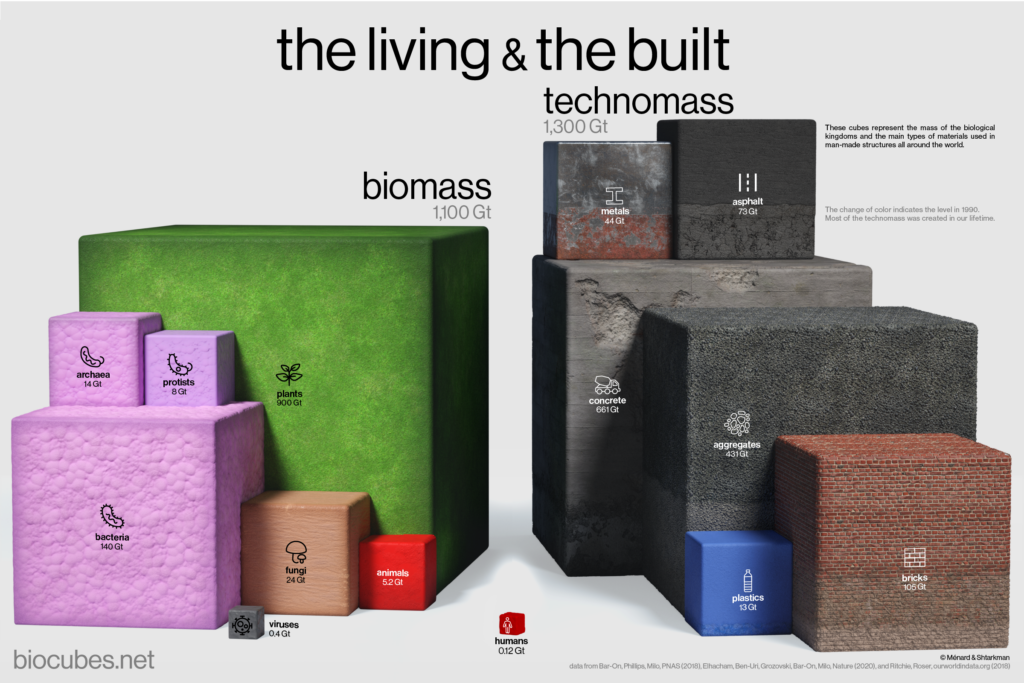
I’ve spent the last two decades working on climate impact and waste assessment for companies and governments across the United States, and have watched as local sustainability efforts have flourished while the global environmental picture becomes more and more grim. One of the biggest challenges I’ve seen is that the traditional metrics of sustainability–carbon footprints, waste reduction targets, efficiency gains–are designed to drive localized, regional progress. These measures of ‘success’ overlook a crucial reality: when we cut costs and resource use in one place, consumption often increases somewhere else in the world. As sustainability professionals leading the charge for a more just and regenerative future, our biggest challenge today is not merely advancing existing measures of ‘success.’ Instead, we must fundamentally reimagine our relationship with an economic system that prioritizes growth above all else and shift toward one that values health through balance and harmony with nature. When the planet is healthy, we are healthy.
This reality is pushing sustainability leaders to ask harder questions: How can we create genuine prosperity while respecting Earth’s ecological limits? What would it look like to build a materials economy that serves both people and planet? The answers require us to examine not just how we manage materials, but how we think about growth itself.
The Limits We Face
There is already a great body of knowledge on “the ability to thrive as a society, while respecting biophysical limits.”4 This wisdom, however, stems from ways of living and being that do not center economic size as a marker of societal well-being. In contrast, the goal of most economies around the world today is to simply grow.
The Center for the Advancement of the Steady State Economy recently showed that the world’s seven largest economies have enshrined “economic growth” as a goal in and of itself, detached from any kind of social or well-being metrics.5 But economic growth doesn’t happen in a vacuum: our environment, people, and communities are all impacted by macroeconomic decisions. Considering this, three key issues emerge that challenge our perception of growth’s ‘success’:
- First, there are ecological constraints. The global economy must operate within Earth’s ecological limits – thresholds for resource extraction, land use, and pollution that we are currently exceeding. We simply cannot sustain current levels of ecological demand.
- Second, there are efficiency limitations. Our current materials economy is deeply interconnected: when one company reduces its material use, the saved resources are typically invested into other parts of the economy, driving further growth and consumption. Time and experience have proven that efficiency gains do not actually reduce resource use, unless they are paired with a commitment to limit demand.6
- Finally, there are equity concerns. The benefits and burdens of our materials economy are not shared equally. While ~10% of global society controls 90% of the wealth,7 billions still lack access to basic resources for a dignified life.,8,9 Shifting our economy towards alternative and more efficient technologies alone will not address this fundamental imbalance.
Let’s dive a little deeper into how these issues affect people and our planet:
Earth’s Limited Resources
We must acknowledge and work within Earth’s limits to economic growth. Our collective ecological demands have been outpacing the regenerative capacity of our planet since the 1970s.10 Globally, we’ll need to shrink the total size of that demand in order to bring our footprint back in balance with nature.
Humans’ fossil-fueled economy has pushed the global climate past its natural limits: recent highly visible weather events related to our changing climate are symptomatic of pushing past ecological constraints. This isn’t unique to climate–all natural systems have boundaries and it is now time for us to work within the boundaries of a healthy, thriving planet.
Beyond the Efficiency Trap
Efficiency gains must be coupled with limits on total ecological demand. To date, the most common approach for reducing ecological demand has been introducing more efficient technologies: new power plants, more fuel-efficient engines, and ever-smaller computing devices deliver their services with less material input per unit of output. But when we reduce resource use through efficiency, a growth-focused economy uses those saved resources to consume more elsewhere. It’s like squeezing a balloon – the air just moves to a different spot.
The factors that drive ecological change on planet earth are connected to commodity flows that operate across political boundaries, meaning reduced demand in one part of the economy is easily offset by increased consumption in another. For example, the U.S. has reduced its fossil fuel demand over the past two decades, but the global economy has easily reallocated those savings in the planetary push for economic growth. In practice, efficiency gains are often redirected into making more products, feeding a cycle of continuous growth that ultimately leads to more extraction, more waste, and more strain on our planet’s systems.
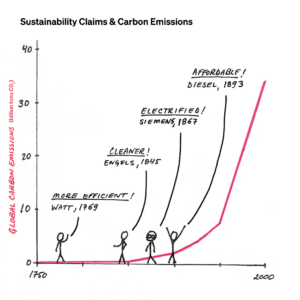
Illustration by John Mulrow, PhD
Centering Equity
Sustainability strategies must prioritize equity alongside environmental goals. Our traditional, Western understanding of economic growth prioritizes gain for a small subset of the global population. Even if economic growth were intended to benefit all humanity, it has failed in practice.
In his book Less is More: How Degrowth Will Save the World, Jason Hickel presents data showing that while global GDP per capita increased fivefold between 1980-2016, this growth was highly unequal, with only the wealthiest 10% of people seeing their incomes grow at or above this rate. The richest 1% gained disproportionately more, while the vast majority of people experienced minimal economic benefits despite overall growth.11 This pattern repeats even within high-income countries, as Matt Orsagh, a post-growth finance advocate, has pointed out. In the US, it is also the wealthiest 10% of people that have accumulated the majority of economic growth for themselves in recent decades.12 Clearly, there is a need to rebalance and redefine economic flows so that when and where growth happens it benefits those truly in need.
New Metrics for a Healthy, Thriving Planet
Kate Raworth’s Doughnut Economics concept has provided a framework for seeking social and environmental sustainability without prioritizing growth for growth’s sake. The doughnut diagram represents a safe and just operating space for humanity, with the inner boundary representing minimum requirements for human well-being (the social foundation), and the outer boundary representing planetary systems impacted by economic activity (ecological ceiling).
The reality is that social foundation metrics are not being met for many across the world and yet we are exceeding planetary boundaries, atmospheric CO2 levels being just one of several ecological emergencies. Raworth’s work has been effective at helping sustainability professionals break from efficiency as a marker of environmental impact reduction, instead pairing planetary-scale impact metrics with socioeconomic ones like equity and access.
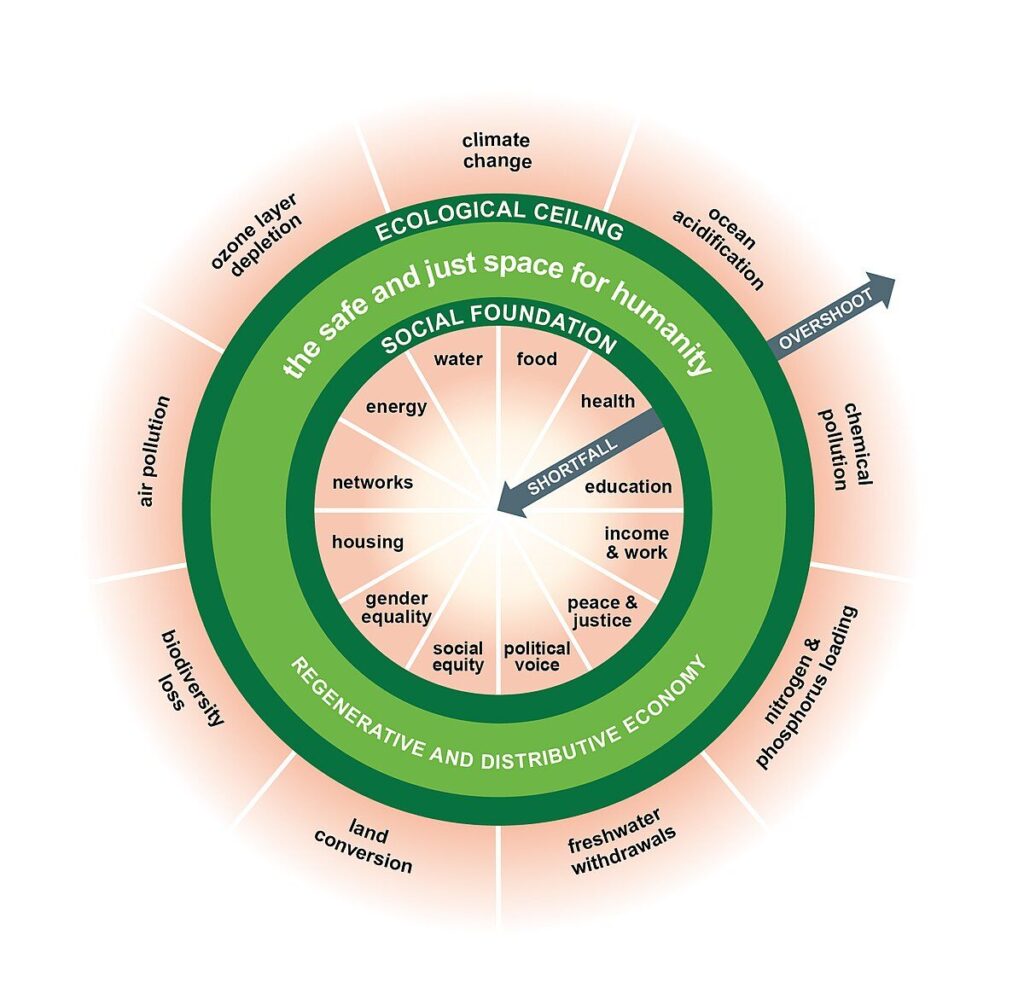
Well-Being
New ways of thinking about growth bring fresh focus to the fundamental question of what truly constitutes ‘wealth’ versus ‘well-being.’ While social and ecological metrics provide important global context, numbers alone won’t be enough to persuade a critical mass of environmental advocates and professionals to break from the commitment to growth embedded in most sustainability plans.
To orient away from growth, we’ll need enticing ways to live the good life with less economic throughput. That’s why this reimagining of economics prompts psychological inquiries into the question “how much is enough?”, explorations of indigenous ways of knowing and being, and long-standing critiques of economic development goals aimed at increasing Gross Domestic Product (GDP) as the sole marker of societal well-being.
A Future Beyond Growth
As a sustainability professional on this journey, I constantly remind myself that the path beyond growth is still being trodden. It extends from many places in humanity’s past, and the justifications for redefining growth are not solely technical; ongoing ecological degradation is not in need of ever-more refined climate, energy, and economic forecasting techniques. Economic growth is a social and political commitment embedded in daily life. Challenging it necessitates action in both personal and professional spheres.
Here are some steps to begin:
- Foster Dialogue: Sometimes asking questions like “How much is enough?” or “How can we use less?” are enough to spark a conversation that questions the growth paradigm in a constructive way. You can share and build on writings that critique growth–influential works like Doughnut Economics by Kate Raworth, Less is More by Jason Hickel, and Braiding Sweetgrass and The Serviceberry by Robin Wall Kimmerer provide valuable perspectives. The Degrowth Institute’s discussion toolkit also offers practical resources for sparking conversations.
- Integrate Global Contexts: Add a global economic perspective to your projects. For example, consider what happens to financial and resource savings enabled by efficiency measures. Can these savings be reinvested in ways that increase equity or protect the environment, instead of prompting more consumption? What are the risks that resource demand resurfaces elsewhere in the economy? Asking such questions can shift the focus toward systemic change.
- Stay Motivated: Breaking from growth-centric paradigms is crucial for self-regulating our economy within planetary boundaries. Although unprecedented in modern times, this shift promises significant social and environmental benefits and recent summaries in Ecological Economics offer concrete policy proposals.
For those based in the U.S., various organizations—including the Post Growth Institute, CASSE, Arketa Institute, and DegrowNYC—are advancing the movement through discussion, debate, and action.
Sustainability’s next great challenge is to build a smaller, fairer economy that ensures a thriving future for all within the limits of our one shared planet.
Remember, the goal isn’t perfection—it’s progress toward a materials economy that works for both people and planet. Each step we take builds momentum for broader change. The transition to balance our ecological footprint won’t be easy, but it’s essential for a shared future. As sustainability professionals, we have the opportunity–and responsibility–to lead this transformation. By taking these concrete steps within our organizations, we can help create a future where innovation serves the goal of true sustainability rather than limitless growth.
About the Author
John Mulrow, PhD
John Mulrow is Executive Director of the Degrowth Institute and Adjunct Assistant Professor of Environmental and Ecological Engineering at Purdue University. His work is focused on improving environmental assessment methodology through perspectives that prioritize social equity and limits to growth. He holds a PhD in Civil Engineering from University of Illinois Chicago and a BS in Earth Systems from Stanford University.
DEFINITIONS
Ecological footprint: Economic goods and services require inputs that originate from natural systems
Ecological resources include raw materials such as water, fuels, plants, and mineral ores and natural functions such as water flow, photosynthesis, and atmospheric circulation.
Ecological demand is the ecological footprint required to meet human wants and needs.
Ecological constraints are the limits of demand, beyond which certain natural systems become destabilized. These limits can be characterized in many ways but we prefer the Stockholm Resilience Institute’s planetary boundaries framework.
FOOTNOTES
- https://footprint.info.yorku.ca/data/
- https://footprint.info.yorku.ca/data/
- biocubes.net
- https://www.cambridge.org/core/books/exploring-environmental-violence/degrowth-perspective-on-environmental-violence/561C3D8FA140F8EB1EFCE6EDBEE8A46E
- https://steadystate.org/the-economic-priority-of-the-seven-wealthiest-countries-more-wealth/
- See “Banking sustainable consumption’s savings” in https://www.researchgate.net/publication/388491654_Degrowth_and_Sustainable_Consumption
- https://www.credit-suisse.com/media/assets/corporate/docs/about-us/research/publications/global-wealth-databook-2022.pdf
- https://www.activesustainability.com/environment/natural-resources-deficit/
- https://www.sciencedirect.com/science/article/pii/S2542519624000421
- https://footprint.info.yorku.ca/data/
- Hickel, J. (2022). Less is more: How degrowth will save the world. Penguin Books.
- Orsagh, M. (2024, December 16). Degrowth is the Answer | Substack. https://degrowthistheanswer.substack.com/
In 2024, Habitable experienced significant growth and transformation. Our strategic rebrand from Healthy Building Network to Habitable marked a pivotal shift in how we communicate and achieve our mission. We expanded our organization’s historic focus on green chemistry and on the lifecycle effects of toxic chemicals in building products to scale our results and achieve pollution reduction, climate change mitigation, and equity and environmental justice. Through new and growing partnerships with Beyond Petrochemicals, Cooper Carry architecture and design, and many others, we’ve positioned ourselves to tackle increasingly complex challenges at the intersection of the materials economy and planetary health, ensuring a habitable future for all. Check out our 2024 Year in Review for more information.
Key Milestones That Shaped Our Year
Redefining Our Identity
This year, our transition to Habitable represented more than a name change—it embodies our new vision: All people and the planet thrive when the materials economy is in balance with Earth’s natural systems. . This new identity reflects our team’s capabilities and our evolution towards a more comprehensive approach to creating a path to planetary health. The rebrand has enabled us to activate our mission more broadly, setting the stage for deep engagement with new audiences, and more effective communication of our vision for a healthier planet.
Expanding Our Research Footprint
In 2024, Habitable’s research revealed critical connections between building materials and planetary health. Our groundbreaking policy brief, Buildings’ Hidden Plastic Problem, reported a startling reality: the building and construction sector is the second-largest consumer of plastics globally, behind packaging. This research advances our work among global audiences, reshaping the conversation around plastic pollution by highlighting a crucial opportunity to reduce fossil fuel demand through better building practices. We deepened this investigation through our fact sheet Our Disposable Plastic Buildings, developed in partnership with Perkins&Will, and engaged industry leaders through our webinar Buildings Contribution to Global Plastic Crisis.
Beyond our pioneering work on plastics, we expanded our research to address planetary health challenges across various scales. Our report, Advancing Health and Equity through Better Building Products, highlights examples of leaders within and beyond Minnesota’s built environment who are taking action toward safer material choices and provides guidance on how the real estate industry can begin working towards a healthier future. A joint article with SERA Architects, Healthy Materials and the Constitutional Responsibility for Health and Wellbeing, emphasizes the need to prioritize solutions that address both climate change and toxic pollution in frontline communities. Meanwhile, our webinar Redesigning the Materials Economy for People and Our Planet convened global thought leaders to explore systemic solutions to these same challenges. These interconnected initiatives have positioned Habitable at the forefront of research linking building materials to both environmental and human health outcomes, setting the stage for even deeper investigations in 2025.
Building Stronger Partnerships
Transformative partnerships defined our work in 2024. With support from Beyond Petrochemicals, we launched an innovative research exploring the significant human and environmental impacts from plastics use in the building sector. This collaboration enabled us to highlight the necessity of including the built environment in plastic policy considerations, marking our entry into the global effort to reduce plastic pollution, including a partnership with Dr. Bethanie Carney Almorth, who is involved in the Global Plastics Treaty negotiations. Our growing network of partners—from universities, corporations, government agencies to NGOs—has enriched our approach and expanded our capacity to drive meaningful change.
Growing Our Community
The Habitable team expanded in 2024, welcoming Priya Premchandran, a seasoned sustainability practitioner with over 15 years of experience at the intersection of the built environment and human health, who has already shaped our InformedTM initiative in profound ways. Our presence at major conferences and leading firms across the country–including Greenbuild, Verge, CannonDesign, AIA MN, USGBC Green Schools and more–positioned us within crucial discussions about material health impacts, while our convening a community of practice in Minnesota participation helped forge new connections with built environment innovators, like the Lower Sioux Community. These engagements have not only elevated our voice in key conversations but have also informed our strategic direction.
Looking Ahead
2025 marks Habitable’s 25th anniversary year. The foundations we’ve built in 2024–our strategic rebrand, renewed research focus, strengthened partnerships, and expanded community–position us to pursue our mission and vision with renewed vigor.
The challenges facing planetary health demand bold action and fresh thinking. Through our work, Habitable remains committed to catalyzing the transformative changes needed for a more sustainable and equitable future.
If you have appreciated our resources and efforts, please consider a donation. We look forward to working with you in the new year!
The consumer-focused holidays are here, with Black Friday, Small Business Saturday, Cyber Monday and more. This season presents an opportunity to give gifts that are memorable and special while minimizing impacts on people and our planet.
In a world where our “stuff” increasingly impacts our climate, communities, and planet, you have the power to advance a more sustainable future. Share love for your family, strengthen your community, and protect the environment by making healthier choices – something we can all celebrate.
Ready to get started? We’ve gathered the best resources to ensure your holidays support a world where all people and the planet thrive.
Celebrate Differently Your Guide to Meaningful Giving
The most treasured gifts often can’t be found in a big-box store. This holiday season, discover the joy of giving that creates connections, supports your community, and nurtures our shared environment. Here are wonderful ways to make your celebrations more meaningful:
Create Memories Together
Transform your gift-giving into shared experiences that build lasting bonds. Cook a festive meal with loved ones, enjoy a local theater performance, or spend a day volunteering for a cause you support. These moments can become stories you’ll tell for years to come.
Embrace Cultural Traditions
Take inspiration from the heartwarming Icelandic tradition of Jólabókaflóð, where families gift books and spend cozy evenings reading together by the fireplace. Choose books from your local library and create your own version of this beautiful custom.
Give from the Heart
Transform simple ingredients into treasured gifts by creating homemade treats in charming mason jars. Or explore your local Buy Nothing Group, where the spirit of reuse and community sharing turns pre-loved items into new treasures.
Empower Change
Make your giving go further by supporting Indigenous and Black-owned businesses, or celebrating Giving Tuesday (December 3rd) by contributing to organizations working toward a healthier world. If Habitable made your list, your contribution for a healthier world can be made here.
Shop Mindfully
When purchasing new items, you have more tools than ever to make choices that align with your values:
- Explore the Environmental Working Group’s Consumer Guides to discover products that meet high standards for health and sustainability
- Use the DetoxMe app from Silent Spring Institute to make informed choices about everyday products
- Check the Retailer Report Card from ToxicFreeFuture to support companies leading the way in sustainable practices
Support Local Artisans
Your community is filled with talented artists, craftspeople, and ethical manufacturers whose work tells a story. When you choose their creations, you’re not just giving a gift – you’re investing in your local economy and helping creative spirits thrive.
Inspiration for the Journey
Deepen your understanding and find inspiration through these enriching resources:
- Watch “Buy Now: The Shopping Conspiracy” on Netflix, an eye-opening documentary that reimagines our relationship with consumption and charts a path toward positive change
- Be moved by “The Green Buffalo,” showcasing the Lower Sioux Indian Community’s inspiring journey toward sustainable housing and economic renewal
- Explore The Serviceberry, a new book by Dr. Robin Wall Kimmerer, offering a fresh perspective on our relationship with consumption and nature
This holiday season, let’s celebrate the power we have to create positive change through our choices. Every mindful decision, every local purchase, and every shared experience builds momentum toward a future where our celebrations honor both people and planet.
Together, we can make this holiday season one of connection, purpose, and joy.
Wishing you a season filled with meaningful moments,
The Habitable Team
The circular economy is a transformative system where materials are continuously repurposed, ensuring nothing becomes waste and nature is regenerated.
This approach involves processes like maintenance, reuse, refurbishment, remanufacture, recycling, and composting to keep products in circulation. By decoupling economic activity from finite resource consumption, the circular economy addresses climate change, biodiversity loss, waste, and pollution. Rooted in the principles of eliminating waste and pollution, circulating materials at their highest value, and regenerating nature, this resilient system benefits businesses, people, and the environment.
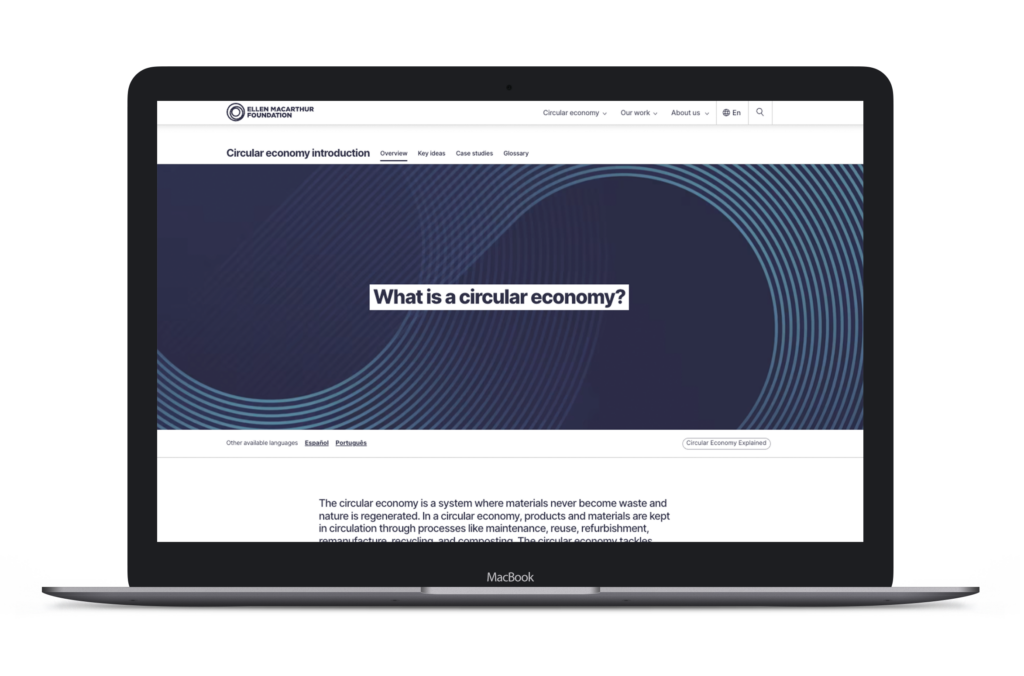

In this opinion piece, architect Martha Lewis addresses the ecological polycrisis of the twenty-first century and its impact on the architectural sector, emphasizing the urgent need for architects to reassess material choices and construction methodologies to mitigate environmental consequences.
The Resource Efficiency Collective at Cambridge University explores how to deliver future energy and material services while reducing resource use and environmental impact, aiming to find suitable metrics and solutions for a more resource-efficient society.
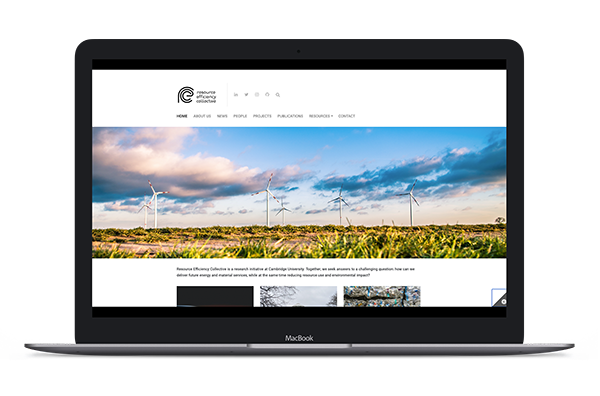
The Equitable and Just National Climate Platform is a collaborative effort between environmental justice and national environmental groups to develop inclusive and equitable national climate policy ideas and advocate for shared policy goals.

This website explores the concept of planetary boundaries, a framework of nine key Earth system processes that humanity must stay within to ensure long-term sustainability and avoid irreversible environmental harm.

Women’s Voices for the Earth (WVE) advocates for a future free from the impacts of toxic chemicals with a focus on gender justice and intersectional solidarity, using expertise in research, advocacy, and organizing.

Project Drawdown is a nonprofit organization dedicated to advancing effective, science-based climate solutions, fostering bold new climate leadership, and promoting new narratives and voices to help the world stop climate change.


 Health
Health
 Equity
Equity Climate Change
Climate Change